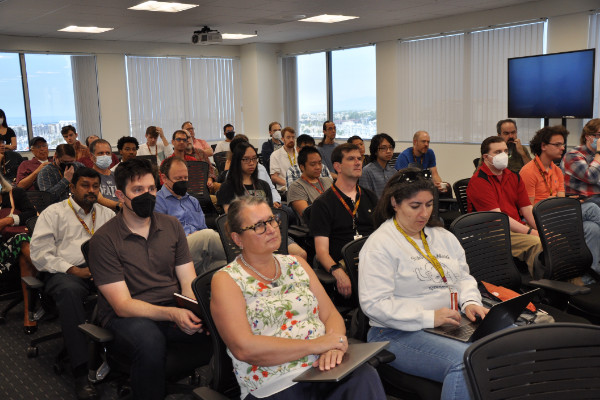Latest News

The End of Academic Writer’s Block? This Tool by USC Scientists Writes Research Papers in Under an Hour

AI System Built at USC Helps Investigators Track Down and Convict Sex Traffickers

Scientists Propose New Explanation for Quantum “Spookiness” That Einstein Might Actually Like

AI Tools That Once Required Supercomputers Are Now Within Reach for Southern California Researchers

From Cancer Research to Smart Cities: USC Builds Platform to Test Privacy-Preserving Data Sharing Technologies

Why Talk About AI Governance if AI Isn’t Governable?

What Would It Take to Eat Breakfast on the Moon?

Scientists Create Ultra Fast Memory Using Light
Delivering the future
ISI's mission is to advance society through pioneering research and technological innovation. We cultivate an intellectually vibrant environment where researchers are empowered to imagine bold solutions to complex problems and to develop into world-class leaders. Guided by integrity, inclusion, and a commitment to excellence, we create unprecedented capabilities that harness information to transform lives.
Research & Development
Part of the University of Southern California’s Viterbi School of Engineering, ISI is a pioneer in research and development across an exceptionally wide range of advanced information processing, computer, and communications technologies.
Our broad expertise spans artificial intelligence, computational systems and technology, space engineering, informatics systems research, and networking and cybersecurity. Bridging multiple technology disciplines through both academic and industry expertise, ISI continues to shape the technologies of tomorrow.


Centers
ISI Centers are internationally renowned for pioneering research in a multitude of areas and disciplines, with collaborations with Lockheed Martin, Raytheon, Northrop Grumman, and numerous other organizations. From quantum computing to global space applications, ISI Centers push forward the boundaries of innovation.
MOSIS
In 1981, a request from DARPA led to USC establishing The MOSIS Service at ISI — a silicon prototyping and low volume production service for custom and semicustom integrated circuits.
Over the past 40 years, The MOSIS Service has collaborated with over 50 US government laboratories and agencies, 800 domestic and foreign colleges and Universities, and more than 100 commercial companies, and continues to support the advancement of microelectronics.


Join the Future
To build upon its successes and global reach, ISI actively recruits exceptional talent. We are dedicated to investing in tomorrow’s leaders, providing numerous internship, job, and program opportunities for students, as well as unique opportunities for exceptional researchers in information sciences and related fields.
Featured Job Openings
To build upon its successes and global reach, ISI actively recruits exceptional talent. We are dedicated to investing in tomorrow’s leaders, providing numerous internship, job, and program opportunities for students, as well as unique opportunities for exceptional researchers in information sciences and related fields.
Analog Design & Layout Engineer
Marina del Rey, CA
In Office
Seeking an engineer skilled in analog/RF and digital circuit design, and physical layout. The role involves working with MOSIS 2.0 customers, supporting USC’s tape out classes, and contributing to funded research projects in the USC ECE department.
EDA Infrastructure Engineer
USC University Park Campus
In Office
Manage and support multi-vendor EDA tool flows with a focus on digital design. Oversee cloud platforms for tool access and IP repositories, providing support to internal and external users in a collaborative, cloud-based EDA ecosystem.
ASIC/FPGA Research Engineer - Digital Design
Arlington, VA
Hybrid Eligible
Perform front-end digital design of advanced ASIC or FPGA-based prototypes addressing problems of national importance while developing novel computer architectures, RTL models, and systems-on-chip.
Did you know

ISI SEMINAR SERIES
Keep up-to-date with the ISI seminar series by subscribing below.
You will have the option of subscribing to individual seminar topics.
subscribe to notificationsISI SEMINAR SERIES
Keep up-to-date with the ISI seminar series by subscribing below.
You will have the option of subscribing to individual seminar topics.
Information Sciences Institute
As a world-class institution, ISI offers a prestigious, intellectually vibrant environment, combining the best of major research universities and industry labs on both coasts.
ISI is committed to forging a better future. Please visit our careers web page to learn how you can become a part of the ISI community.



USC School of Advanced Computing USC Information Sciences Institute
Read about Professor Narayanan’s unique accomplishments here: https://lnkd.in/gYnGz2P5
Bryan Min, a member of the USC Viterbi Board of Councilors and namesake of the Min Family Engineering Social Entrepreneurship Challenge, visited the USC Information Sciences Institute’s offices in Arlington, Virginia, on Thursday.
Min, who also serves as founder, chair, and CEO of Epsilon Systems, was hosted by ISI Associate Director Steve Crago; Matthew French, director of ISI's Computational Systems and Technology division; and John Paul Walters, research director in Computational Systems.
The ISI team was inspired by their discussion with Bryan and look forward to many collaboration opportunities! Thanks to Dean Yannis Yortsos for making this connection.
This newly developed AI tool can transform research notes into a submission-ready academic paper in under an hour, offering a promising way to ease academic writer’s block and speed up scientific communication. It’s a thoughtful application of AI to a challenge nearly every researcher knows too well.
Kudos to Mayank Kejriwal and Zhisheng Tang for pushing forward practical, researcher-centric innovation.
Read our story: https://lnkd.in/gtcHXJjK
His work on using AI to help investigators track down and convict sex traffickers — now featured in one of the world’s most prestigious scientific journals — is a remarkable achievement and a testament to the power of technology for social good.
This recognition not only honors his scholarly excellence, but also highlights the real-world impact of applying cutting-edge research to difficult societal challenges.
Read more: https://lnkd.in/gR-UiArp
Here’s to many more breakthroughs that drive positive change!
This paradox has stalled countless breakthroughs in healthcare, transportation, cybersecurity, and beyond. But we're building the solution.
Big news from USC Information Sciences Institute: The National Science Foundation (NSF) just awarded us $1M+ to build TEPPIT (Testbed for Privacy-Preserving Technologies for Data Sharing and Analysis) — a national testbed that will transform how organizations evaluate and deploy privacy-preserving technologies.
Here's the challenge: The technologies exist. Federated learning, differential privacy, secure computation — these methods can enable data collaboration without exposing sensitive information.
Our solution: TEPPIT provides a common evaluation environment where researchers and practitioners can systematically test and compare privacy-preserving technologies under realistic conditions. No more guessing. No more choosing between useless AI models and regulatory violations.
The impact spans industries:
→ Hospitals collaborating on cancer detection without sharing patient data → Cities optimizing traffic flow without tracking individual movements
→ Financial institutions detecting fraud while protecting customer information
→ Educational institutions researching student outcomes while maintaining privacy
Led by Jelena Mirkovic, alongside John Heidemann, Jose-Luis Ambite, David Balenson, and Yuri Pradkin, TEPPIT leverages SPHERE Research Infrastructure to ensure evaluation results are meaningful, comparable, and reproducible.
And we're not just building infrastructure — ISI is serving as the central coordination hub for NSF's entire $10M Privacy-Preserving Data Sharing in Practice (PDaSP) program, connecting 10 teams nationwide working to move privacy technologies from research labs into real-world systems.
Over the next three years, TEPPIT will become an open-source resource that grows with community contributions. Success means these technologies transition into actual deployment, enabling organizations to unlock the value of shared data while protecting individual privacy.
Learn more: https://lnkd.in/grEThsHM
USC Viterbi School of Engineering